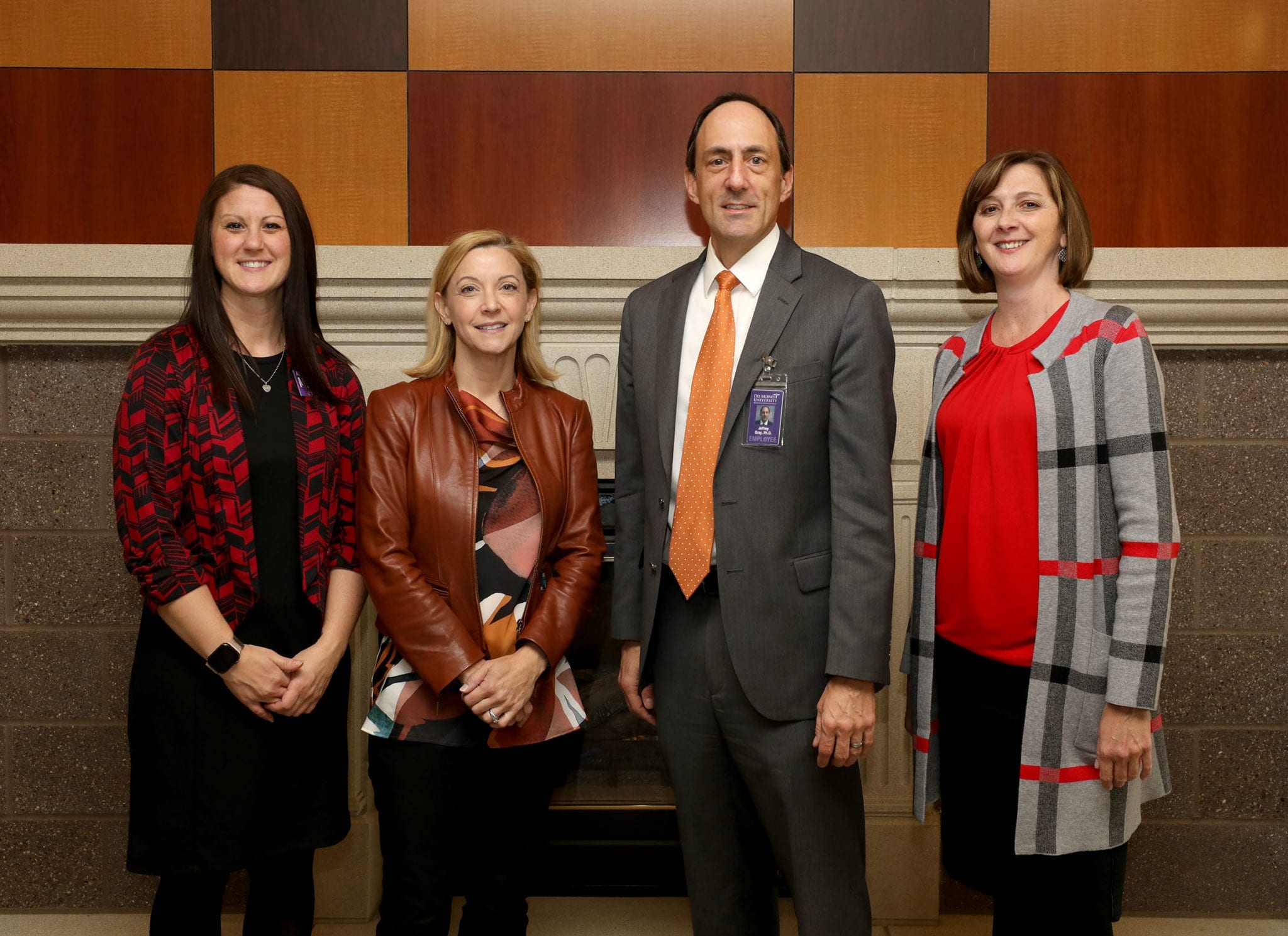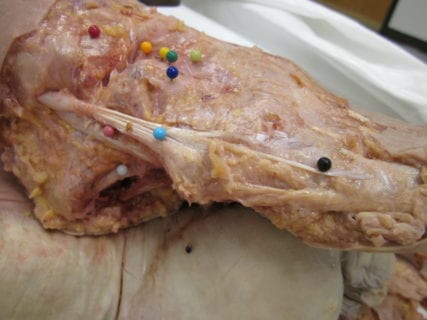
A record number of attendees, 97 presented posters and high-energy oral presentations made the DMU Research Symposium on Dec. 5, 2019, truly worthy of its 10th anniversary. Students and scientists presented their work in anatomy/paleontology, biomedical science, clinical applications, movement science, education and public health. It was like a scientific smorgasbord for the brain.
“This year is special as we celebrate a ‘Decade of Discovery,’ 10 years of university-wide collaboration and scientific achievement,” said Jeffrey Gray, Ph.D., vice president of research and global initiatives. “The symposium has grown considerably in several dimensions that generate benefits for students, faculty and the greater scientific community. An increasing number of investigators have participated over the years, from undergraduate and graduate students getting their exposure to the research process to longtime experienced faculty who are building upon their past work…Collaborative grant submissions have increased, and subsequently, more research dollars have been earned, including support from a number of prestigious funding organizations. These productive interactions continue to generate a greater environment for discovery year after year.”
Dr. Gray reflected that the inaugural DMU Research Symposium drew nearly 170 attendees. This year’s event attracted more than 600 attendees, who ranged from high school students to doctoral degree holders. In addition to viewing and discussing 91 presented posters, they enjoyed six “lightning” oral presentations – fast-paced, five-minute talks – given by students and faculty in programs in osteopathic medicine, health care administration and physical therapy as well as the basic sciences.

“Through DMU’s research department, I have had the opportunity to conduct research for nearly one year, and through it all I have enjoyed the process of becoming confident in laboratory skills,” says Bryce Fiebiger, D.O.’22, whose oral presentations was titled “Lipid nephrotoxicity and increased risk of nephrolithiasis in model of estrogen deficiency.” His colleagues in this research were Jonathan Van Erdewyk, D.O.’21; Bilal Khan, D.O.’20; Victor Babich, assistant professor at Mercy College of Health Sciences; Maria Barnes, Ph.D., assistant professor of biochemistry and nutrition; and Francesca Di Sole, Ph.D., associate professor of physiology and pharmacology.
“Working in the lab has taught me to problem-solve in new ways, learn from numerous failures and that confidence and competence will eventually result from persistent practice,” Bryce adds. “The Research Symposium hosts such a variety of research areas that everyone should be able to find a few projects to learn about that they find interesting.”
Dr. Babich is among several faculty scientists from other institutions who attend the symposium. He has participated both as a presenter and as poster reviewer. “For students, it’s a great opportunity to present at venues outside their institutions and to work on more advanced research projects,” he says.
Brian Gentry, Ph.D., associate professor of pharmacology at Drake University’s College of Pharmacy and Health Sciences and director of the Drake Undergraduate Science Collaborative Institute, also has served as a poster reviewer at the symposium for several years. “I do it to make sure the students that are presenting are challenged and uncomfortable. Whenever doing scientific research, one of the most important aspects is the ability to communicate your findings – are they reliable, do they hold up to scrutiny?” he says. “I find that as a poster reviewer, I have the obligation to better these young researchers by challenging them to think critically about what they are doing and to put a little pressure on them, because I find students grow the most and improve the most when they are uncomfortable and/or under pressure.”
Holly Showalter, the health science and medicine instructor for Waukee APEX, a program for high school juniors and seniors, brings some of the youngest scientists to the Research Symposium – her own students. Also a past presenter, with Elitsa Ananieva-Stoyanova, Ph.D., assistant professor of biochemistry and nutrition at DMU, she says her students benefit both from the knowledge they gain and their interaction with graduate students.
“They get to learn, practice their professional skills and talk to DMU students about their research as well as their career paths,” she says. “I can’t simulate that in my classroom.”
Providing this year’s symposium keynote was Julie Ledgerwood, D.O., chief of the clinical trials program at the Vaccine Research Center (VRC) of the National Institute of Allergy and Infectious Diseases. In her talk, titled “Accelerating Vaccine R & D in Response to Epidemic Emergence,” she described the discovery and development of a human monoclonal antibody targeting Ebola and discussed the results of Phase 1 and follow-up clinical trials of the antibody’s effectiveness. Created about 20 years agoto find an AIDS vaccine, VRC broadened its scope with the emergence of new diseases and epidemics, including the flu, Zika and chikungunya.

“The reason we have such a broad portfolio, including diseases that may seem obscure, is because those diseases are out there,” she said. She noted that regions of the world with the worst infectious disease burden also have the largest populations, and world air travel means no region is isolated. “We’re all connected,” she added.

Students and faculty were invited to submit images for a scientific photo competition, a component of the Research Symposium now in its second year. The winner of the competition was Taylor Hale, a second-year student in the College of Podiatric Medicine and Surgery with her photo of an anatomical exploration of the lateral column in the context of Charcot foot reconstruction.
Among all the takeaways the Research Symposium offers is the fundamental connection between basic science and medicine, says Bonnie Hall, Ph.D., director of faculty advising and associate professor of chemistry at Grand View University.
“Although I am not a medical practitioner, many of the students I teach go on to become doctors, nurses, physician assistants, etc.,” she says. “I have had students attend several years, and more recently have also had students present posters. The topics of the main presentations have helped them grow as scientists, showing them just how wide-ranging research is and the many ways it intersects with material they are learning as part of their undergraduate curriculum. The poster sessions have also been very valuable – a chance for students to develop professional presentation skills and to learn how to interact with other scientists.”
Conducting research also benefits students who plan to become future health care providers. For her research on the cognitive function of hospitalized patients with anemia, Lakshmi Karuparthy, a second-year student in DMU’s osteopathic medical program, interviewed patients “from a wide variety of demographics.”
“I learned to explain clinical research and establish rapport within minutes of entering a patient’s room,” says Lakshmi, who gave an oral presentation at the symposium about her work. “The communication skills I gained through this project will greatly impact my future interactions with patients. Blood transfusion guidelines will be something almost all of us will have to deal with as practicing health care professionals. Guidelines are always changing, and I believe the research I’ve been working on will broaden restrictive transfusion practices with time.”
In welcoming attendees to the 10th annual Research Symposium, Dr. Gray expressed excitement for the event’s next decade.
“Looking ahead to the next 10 years, DMU’s new campus will be designed to further enhance scientific collaboration and create a vibrant research environment,” he said.
Plan to interact with scientists again next year – save the date for the 2020 DMU Research Symposium: Thursday, Dec. 3. Students are invited to explore additional research opportunities through DMU’s Mentored Student Research Program, too – the application cycle is Dec. 5, 2019, to Feb. 3, 2020, at 8 a.m.

